As an author, Amazon is where you need to be if you want to make a success out of your career, whether you’re publishing in Kindle Unlimited or publishing “wide” (to multiple retailers). But the competition these days is off the charts. You’ll need to write a great story, have an amazing cover and a good keyword research tool to help you set your book apart—whether it’s for Kindle keywords, competition analysis, or Amazon ads. Here are two to consider: KDP Spy or Publisher Rocket.
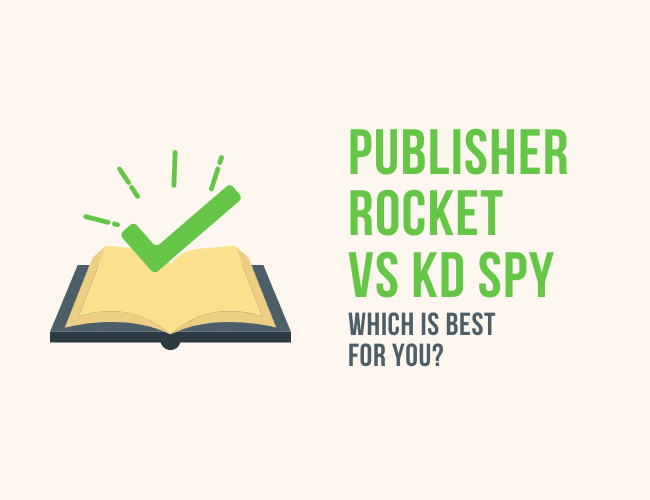
Luckily, there are a few tools out there that help you reverse-engineer the marketing of successful books. These tools are great for idea generation, market research, and putting your book in the best book category position to sell well.
Two popular options are Publisher Rocket and KD Spy.
In this article, we’ll compare them side-by-side and find out which is the best option for you.
Before we get started, I want to be fully transparent and let you know that some of the links in this article are affiliate links. That helps me keep the coffee flowing so I can keep learning and sharing what I learn with you. Of course, it didn’t affect my review.
Let’s dive in.
Publisher Rocket vs KD Spy: Breaking It Down
Publisher Rocket and KD Spy have some key similarities. Both Publisher Rocket and KD Spy offer a similar service. They can be used by both traditional and self-published authors who want to do competitor research for their book.
But there are a couple differences. For instance, KD Spy is a browser extension whereas Publisher Rocket is downloadable software.
To compare the two solutions when making a buying decision, I’ve chosen the following key categories to consider:
- Keyword and Category Research
- Competition Analysis
- Price
Note: There are certain things Publisher Rocket does that KD Spy doesn’t do, like Amazon AMS keywords. While I will mention that in passing later on, I won’t include it in the main comparison feature. Instead, I’m only directly comparing the elements both tools have. You can read a full review of all Publisher Rocket's features here.
Before we get started, you can take a look at the features Publisher Rocket offers here and the features of KD Spy here.
Now, let’s explore both software tools to see which one might be right for you.
Which Is Best for Keyword and Category Research?
One thing you should look for in any Amazon Kindle marketing tool is how they help with your keyword and category research.
When your potential readers visit Amazon, they type in search terms to find what they’re looking for. Or they might search their favorite categories for their next book. You need to make sure your book is showing up in those searches.
Publisher Rocket’s Keyword and Category Research
With Publisher Rocket, for keyword research, all you have to do is enter a seed or base keyword and the software will do the rest. Rocket gives keyword suggestions that show Amazon’s A–Z.
For example, If I type in “romance” Rocket will show “romance alien,” “romance anthology,” and “romance book.” It will also show related searches like “romance fantasy books.”
Another cool feature of Rocket is that you get Amazon search data!
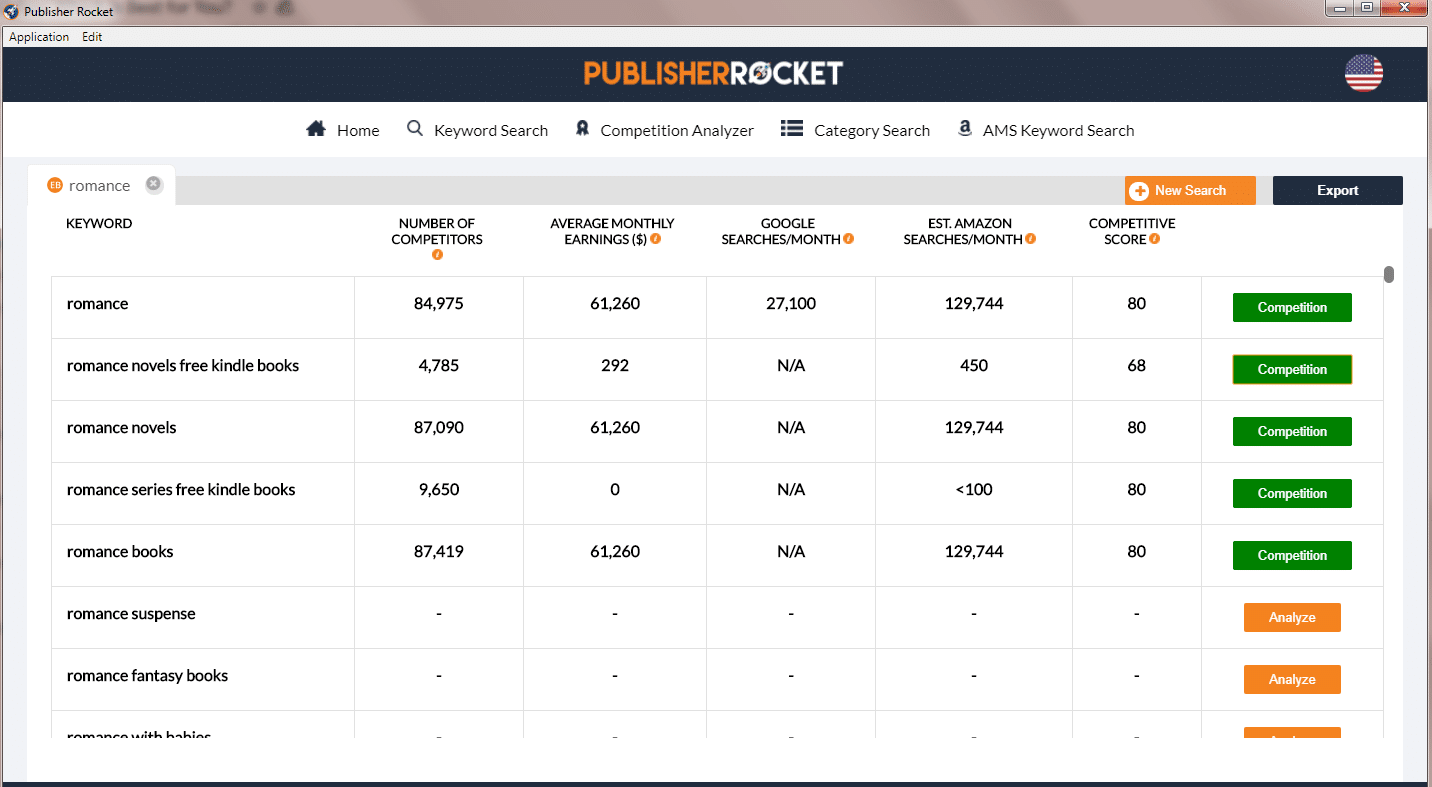
That means you’ll have a ballpark estimate of how many times a keyword is searched every month on Amazon by potential readers. You’ll also get an estimate of how much money is being made by top ranking books.
Rocket also gives a score between 1 and 100 for competitive difficulty. So, the lower the number, the less competitive that keyword is to show up for in Amazon. You can quickly compare keywords and choose the best ones for your book.
For categories, Rocket has access to ALL Amazon categories, including short-read categories, and you can easily browse which categories are popular and which will bring you the best results.
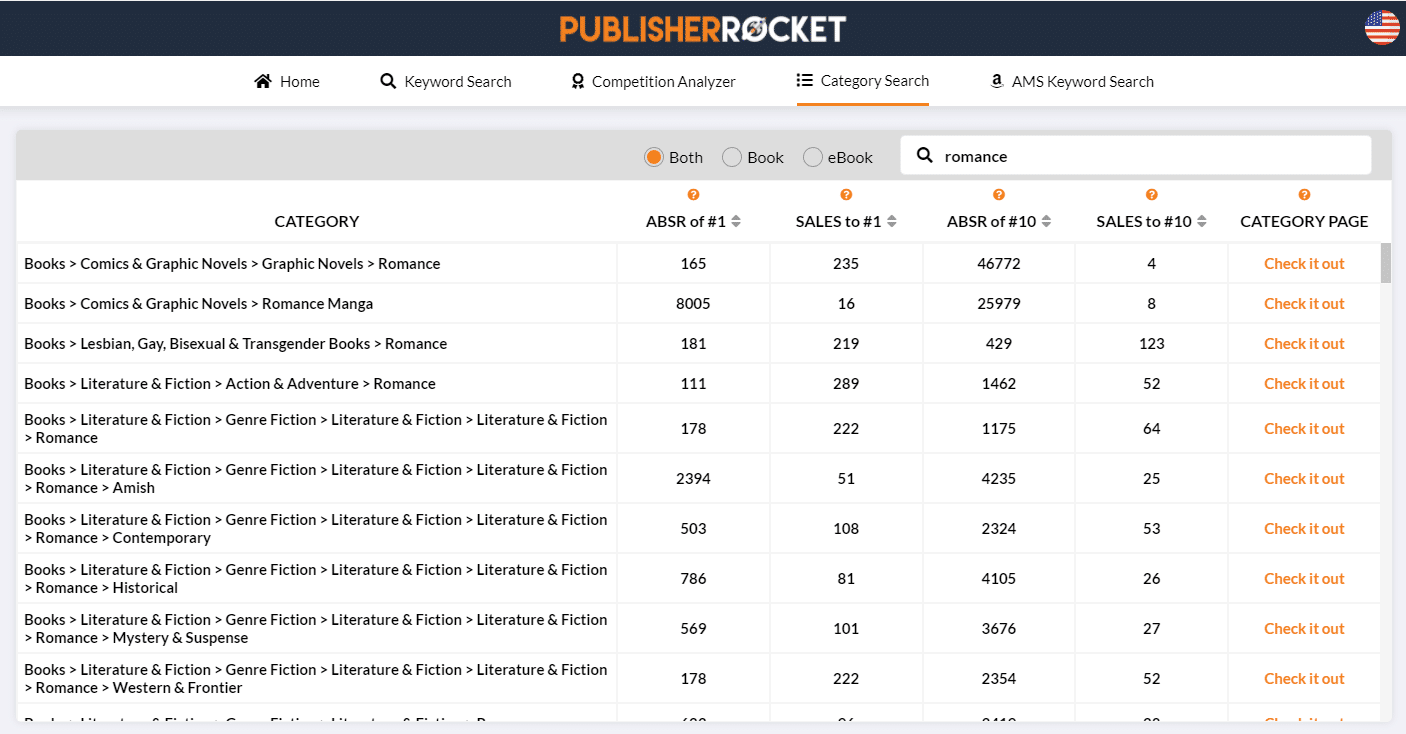
As you can see in the image above, Rocket gives you information that would take you a while to work out on your own. For instance, it shows you how many book sales you need to get to rank number 10 in a given category, and what the Amazon Bestseller Rank is of the book at number 10 in that category.
This information helps you assess which categories you can compete in.
For instance, a category that has a lot of competition will take a lot of sales to get to number 10 or number 1. But you also don’t want to take over in a category where it’s too easy to hit number 10—that just means that there likely aren’t that many readers devouring those books.
All in all, Publisher Rocket’s keyword and category tools are pretty powerful.
KD Spy’s Keyword and Category Research
KD Spy just issued a major update in October 2023. Category research is KD Spy’s best offering, and this is where their browser extension comes in handy.
When you’re in a category, you can open the extension and analyze the category. Then, in seconds, you’ll get a broad look at the category, from the competition to an estimated profit. This feature is pretty cool, and it works well as an extension.
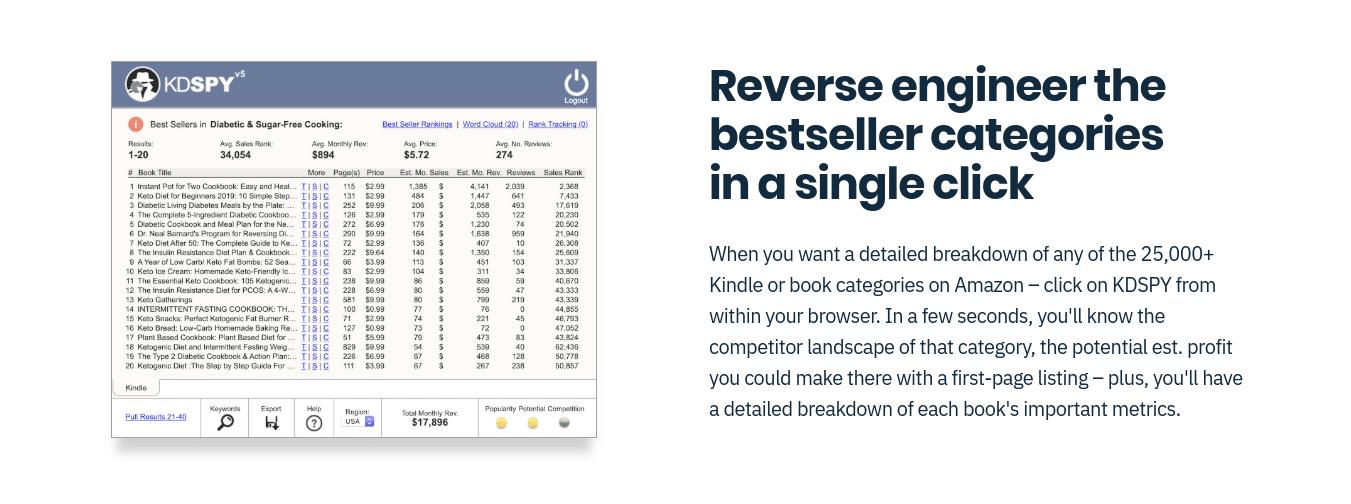
What’s cool about this is that KD Spy analyzes all the books in the category you’ve selected and gives you the average sales rank, monthly sales revenue, average price of the books, and the average number of reviews the books have. This gives a great overview of a category you’re interested in.
It also has a “traffic light” system that shows you how competitive the category is, how popular it is, and what the potential for growth might be.
KD Spy also gives you the number of sales that it would take to hit number 1 in the category and number 20, much like Rocket does.
While KD Spy hangs its hat on category research, it does offer some basic keyword tools.
- Word Clouds: These gather all the book titles that are selling well in a particular category and give you data about which keywords appear the most. This is a handy tool because it provides niche keywords that are already working for other authors.
- Seed Keywords: Similar to Rocket’s keyword tool, you can search for a seed keyword and Spy will give ideas for keywords. Each idea is given a traffic light color for difficulty. Green lights are easiest, and the red ones are harder. You can then click particular keyword ideas to check the data. However, the tool doesn’t give you Google or Amazon search numbers.
Winner
I love things about both these tools. KD Spy's browser extension and ease of use is seriously cool, but Rocket’s presentation of Amazon search data is a game-changer. The fact that there are multiple keyword search tools in Rocket is helpful too.
Having clear values rather than the “traffic light” system pushes Publisher Rocket over the edge for me. That’s an extra degree of clarity to help make informed decisions. Rocket is my winner here.
Which Is Best for Competitor Analysis?
Okay, so we’ve checked out what the best tool is for researching keywords and categories. Now let’s find out which one is the best for checking out your competition.
For this, you want to dig deeper than just a score out of 100 or a green light.
KD Spy Competition Analysis
KD Spy is great for competition analysis. The tool is intuitive and gives an awesome, exportable snapshot of your competitors.
There are multiple ways to find that competition, too. You can search for your competition using a keyword, a category, or even an author’s page.
The author page tool in particular is amazing. You can go directly to an author’s page, use the competition tool, and pull up a list of their existing titles. As it does with keywords, KD Spy also creates a word cloud of words used in the author’s titles.
When searching a category, keyword or author, you’ll get some cool data:
- Prices of competing books
- How many reviews each book has
- Estimated sales
- Review score
This is all straightforward data but gives you exactly what you need.
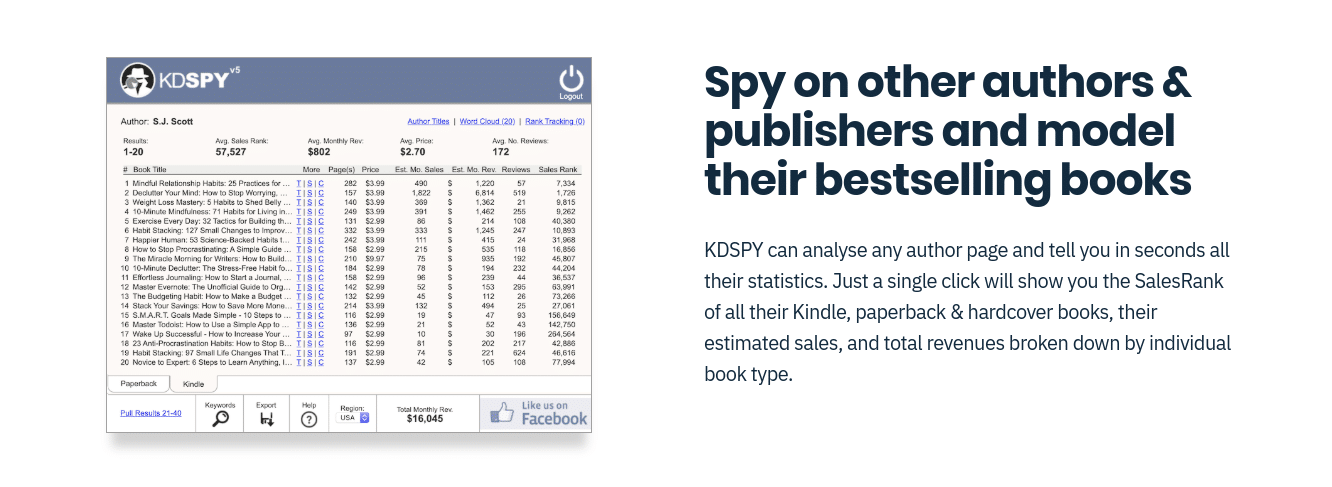
One thing that KD Spy doesn’t do is give options to view the competing book covers. That’s a minor setback given all the information you’re provided.
Publisher Rocket Competition Analysis
There are a few ways you can check out your competition with Rocket.
First, you can do it through your keyword search function by clicking “Competition.” This takes you directly from the keyword feature to the competition for that keyword. Pretty neat!
You can go straight to the competition tab and search from there too. Either way, it’s intuitive to navigate and Rocket is always getting updated to make the program better to use.
One drawback is you don’t get the basic data we spoke about in the Spy section: price, review numbers, etc. But you can analyze your competitors with the tool and go directly to their pages to check them out.
With Rocket’s competitor analysis, you get the dollar amount (an approximation) of sales being made per day and per month for each book. This is important because bestseller lists are updated regularly.
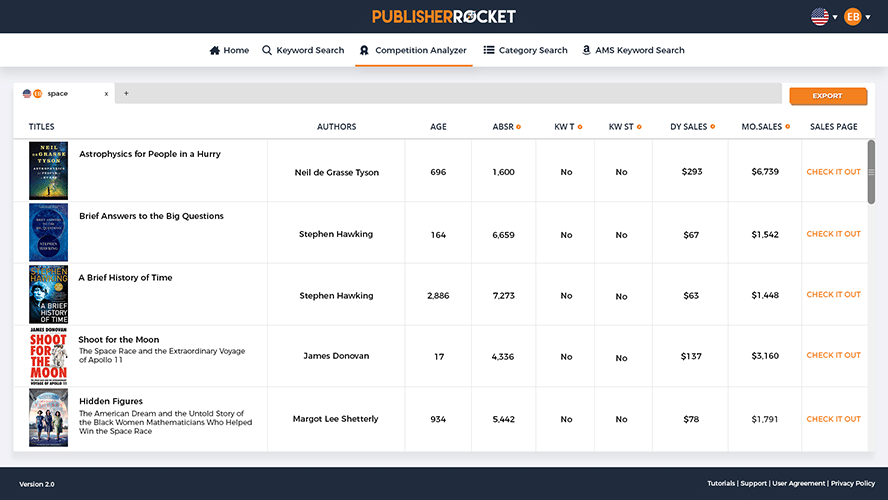
Another feature that’s important is the age of a book. Not a lot of people look at the publishing dates of their competition, but they’re important for a few reasons:
- A new book can throw your analysis off-track. A new book usually has a lot of advertising money behind it, along with a book launch campaign. Sales will drop off in a few days or weeks.
- If all the books are old and still selling well, it could be a hard niche to crack.
Winner
For me, KD Spy’s competition analysis is a little ahead of Rocket’s. Being able to analyze competition in a number of different ways, while browsing Amazon itself, is an awesome function.
That said, Rocket works great with its other functions to analyze your competitors. It also sets itself apart by offering great data and cover images of the books you’re competing against.
But KD Spy takes this round.
Best for Pricing and Value for Money
For the majority of my reviews, I like to leave the pricing category until the end. This is because I don’t want to solely base my buying decision on the cost of a service. Here, we’ll look at Publisher Rocket and KD Spy’s pricing structure.
How Much Does KD Spy Cost?
At the moment, KD Spy sits at a great price point of only $69. The site does say it’s a “today only” price. I can’t promise you’ll still have the $69 price point when you visit the site, but more than likely you will.
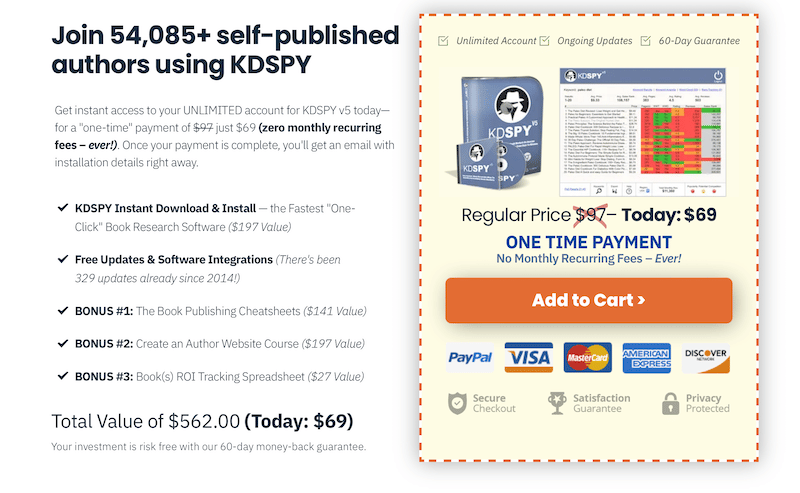
Spy is a one-off payment too, which I love. I prefer that to a subscription when it comes to software.
KD Spy offers a 60-day money-back guarantee too, which is ideal. You can try KD Spy here.
Publisher Rocket Pricing Options
Rocket also offers a one-time payment option. For $97, you get complete lifetime access to Rocket, even if it goes into a subscription model down the track.

Rocket also has a 30-day money-back guarantee, so you can try it with no risk. You can try Publisher Rocket here.
Winner
It really depends here. KD Spy is half the price of Publisher Rocket, but Rocket gives you extra features that I can’t compare head-to-head but Spy doesn’t have them.
That said, if you just want the cheapest option available, regardless of features, then Kindle Spy is the choice for you.
My Take on These Two Services
Drumroll, please…
Both tools will save you time on book research. In fact, you might benefit from using them concurrently to get the most out of keyword research and competition analysis.
Rocket offers a range of add-ons that KD Spy does not have (and you can read more about them in our Publisher Rocket-specific review). One key feature that Rocket has but KD Spy doesn’t is the ability to search for AMS keywords which include book titles, author names, and even ASINs. This can cut hours off the time spent advertising.
KD Spy has some cool features and I like the browser extension access, although I think it would be better as an add-on to software as opposed to the entire product. I find that a lot of browser extensions can be a bit clunky, and if your browser closes you lose all your work. In addition, Spy’s competition analysis is great, but it would benefit from a stronger keyword research tool.
I say, if you want the most features to help you market your book, choose Rocket. If you want the least expensive option, choose Spy.
Both Publisher Rocket and KD Spy will help you position your book on Amazon. For the most features, choose Rocket. For the lowest cost, choose Spy.
Get Publisher Rocket (Best quality) »
Get KD Spy (Best for budget) »
Remember, both services have a money-back guarantee. So if you’re on the fence, you can test-drive both and return the one you don’t want to keep.
Final Thoughts
To set yourself apart you need to put your books in the best position to succeed. A keyword and competition analysis tool can help pave your road to success, but you need to pick a tool that will give you the data you need to position your books. Hopefully, this article has given you enough to work with when making a purchasing decision.
Give Publisher Rocket, KD Spy, or both a try, and see how you can make adjustments that will boost your Amazon sales!



Also, KD Spy’s estimate of author earnings is WAY OFF. It absolutely isn’t accurate. Two people can be looking at the same page in different homes and both will get a completely different number that vary HUGELY. Like one will show the author pulling in $65,000 a month and the other will show the same author bringing in $2500. It is useless to spy on another author’s earnings. Might be okay for keyword research.
Rocket is very interesting indeed but KdpSpy’s markets in other languages is a huge advantage. For that reason alone I have to choose KdpSpy.
Thank you for this review. It is very helpful.